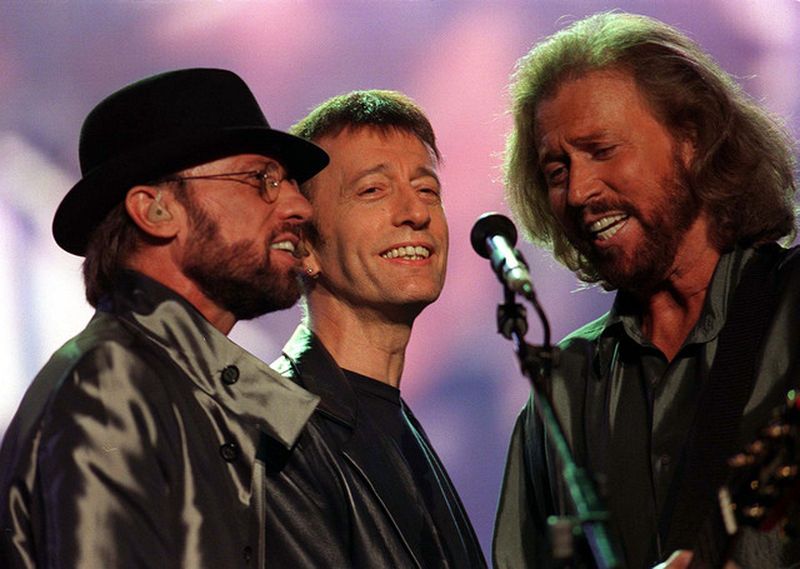The Bee Gees: A Legacy of Harmony, Heartbreak, and the Enduring Power of Brotherhood

In a world where melodies can heal and heartbreak can inspire, few stories resonate as deeply as that of the Bee Gees — the legendary trio whose soaring harmonies and poignant lyrics defined an era. For over five decades, Barry, Robin, and Maurice Gibb not only crafted some of the most iconic songs in pop history but also wove their personal struggles and triumphs into every note. Their music wasn’t just entertainment; it was a soundtrack to resilience, love, and the enduring strength of family.
From Humble Beginnings to Global Icons
The Bee Gees’ journey began far from the glamour of disco lights. Raised in Manchester, England, the Gibb brothers moved with their family to Australia in the late 1950s. It was there that their early foray into music began, performing at small venues before returning to the UK in 1967 to chase a dream bigger than themselves.
Their breakthrough came quickly. With hits like “New York Mining Disaster 1941” and “To Love Somebody,” the Bee Gees captured hearts with their haunting harmonies and lyrical depth. But their ascent was more than luck; it was the product of relentless work, shared ambition, and a sibling bond that anchored them through storms both public and private.
The Disco Revolution and Unmatched Stardom
By the mid-1970s, the Bee Gees had reinvented themselves, becoming synonymous with the disco era. Their soundtrack for Saturday Night Fever didn’t just top charts — it defined an entire cultural moment. Songs like “Stayin’ Alive,” “Night Fever,” and “How Deep Is Your Love” became anthems of a generation, catapulting the brothers to superstardom.
With over 220 million records sold, the Bee Gees became one of the best-selling musical acts of all time. They earned nine Grammy Awards, including the coveted Album of the Year for Saturday Night Fever. Their influence extended beyond performance, writing and producing for legends like Diana Ross, Barbra Streisand, and Kenny Rogers.
But even as fame engulfed them, shadows loomed. The very phenomenon that elevated the Bee Gees also turned against them when disco fell out of favor, and the brothers found themselves vilified for a genre they helped create.
Triumph, Tragedy, and the Test of Time
The Bee Gees’ career wasn’t just about reinvention — it was about resilience. They navigated industry backlash, personal demons, and devastating losses, including the death of their younger brother Andy Gibb in 1988. Andy, a rising star in his own right, struggled with addiction and mental health battles that ended his life at just 30 years old. His loss cast a long shadow over the family and left scars the brothers carried for the rest of their lives.
Yet, they pressed on, returning in the 1990s with renewed vigor and critically acclaimed albums that reminded the world of their enduring talent. Behind the scenes, however, their personal relationships were often fraught, marked by creative tensions and the normal frictions of family bound by fame.
The Final Chapters: Love, Loss, and Legacy
In 2003, tragedy struck again when Maurice, the band’s quiet diplomat and peacemaker, died unexpectedly at age 53 from complications related to a twisted intestine. His death shattered the dynamic that had held the Bee Gees together for decades.
Robin and Barry attempted to keep the music alive, but Robin’s health soon faltered. In 2012, Robin passed away following a battle with cancer, leaving Barry as the last surviving Gibb brother. In interviews since, Barry has spoken candidly about the weight of loss — and the guilt that comes with being the one left behind.
“I’ve lost my best friends,” Barry admitted in a BBC documentary. “I’d trade everything just to have them back.”
A Bond That Never Broke
Despite the heartbreak, what endures is the bond that defined the Bee Gees — a connection so deep it transcended fame, fortune, and even death. Their music, filled with harmonies only siblings could create, remains timeless. From disco dance floors to wedding playlists, their songs continue to bridge generations, carrying whispers of the brothers’ love for one another.
As Barry reflects on his legacy, one theme surfaces repeatedly: gratitude. Gratitude for the music, the fans, and, above all, the brothers who shared his journey from obscurity to immortality.
The Enduring Sound of the Bee Gees
Today, the Bee Gees’ influence reverberates in the work of artists across genres, from pop to R&B to EDM. Their ability to adapt, innovate, and pour raw emotion into melody cemented their place among music’s immortals. Whether it’s the pulsating beat of “Stayin’ Alive” or the tender ache of “How Deep Is Your Love,” the Bee Gees remind us that great music doesn’t just entertain — it heals, it comforts, and it tells the truths we’re often too afraid to speak.
Final Thoughts
The Bee Gees’ story is more than a tale of fame. It’s a chronicle of brothers bound by harmony and heartache, ambition and adversity. It’s proof that even in the face of unimaginable loss, the human spirit — much like their music — can find ways to rise, to endure, and to echo across time.
As Barry Gibb once said:
“Our songs were about life — the pain, the joy, the love. That’s all we ever wanted: for people to feel less alone.”
And perhaps that is the Bee Gees’ greatest gift.